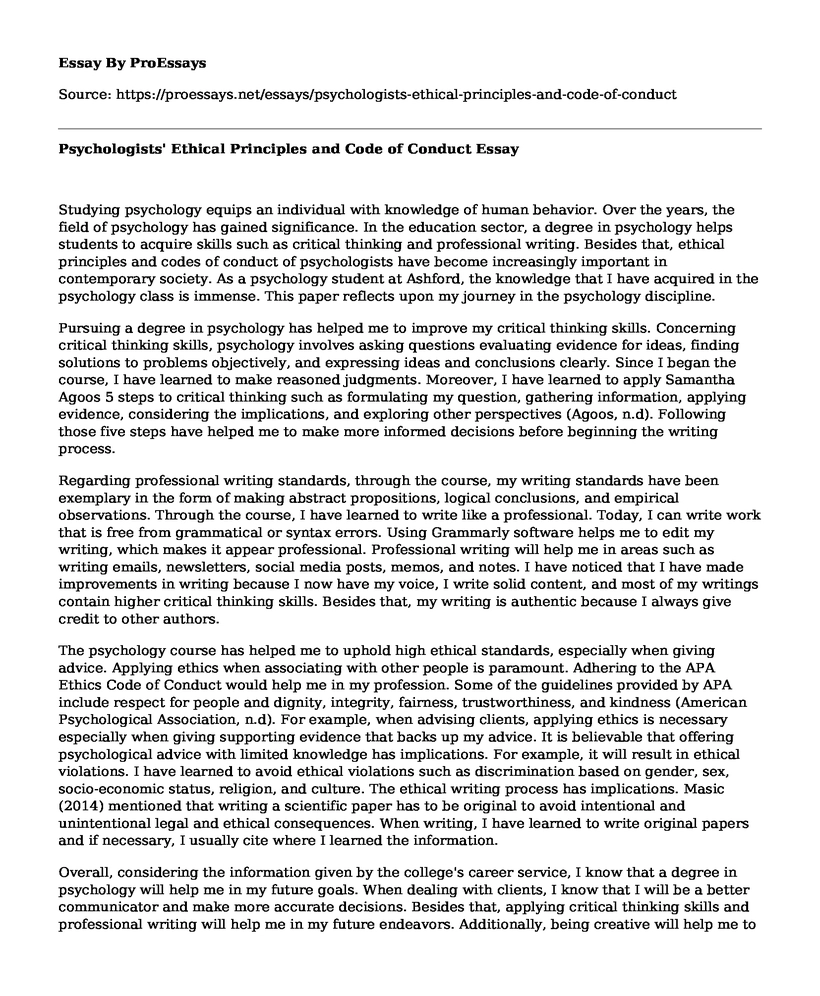Studying psychology equips an individual with knowledge of human behavior. Over the years, the field of psychology has gained significance. In the education sector, a degree in psychology helps students to acquire skills such as critical thinking and professional writing. Besides that, ethical principles and codes of conduct of psychologists have become increasingly important in contemporary society. As a psychology student at Ashford, the knowledge that I have acquired in the psychology class is immense. This paper reflects upon my journey in the psychology discipline.
Pursuing a degree in psychology has helped me to improve my critical thinking skills. Concerning critical thinking skills, psychology involves asking questions evaluating evidence for ideas, finding solutions to problems objectively, and expressing ideas and conclusions clearly. Since I began the course, I have learned to make reasoned judgments. Moreover, I have learned to apply Samantha Agoos 5 steps to critical thinking such as formulating my question, gathering information, applying evidence, considering the implications, and exploring other perspectives (Agoos, n.d). Following those five steps have helped me to make more informed decisions before beginning the writing process.
Regarding professional writing standards, through the course, my writing standards have been exemplary in the form of making abstract propositions, logical conclusions, and empirical observations. Through the course, I have learned to write like a professional. Today, I can write work that is free from grammatical or syntax errors. Using Grammarly software helps me to edit my writing, which makes it appear professional. Professional writing will help me in areas such as writing emails, newsletters, social media posts, memos, and notes. I have noticed that I have made improvements in writing because I now have my voice, I write solid content, and most of my writings contain higher critical thinking skills. Besides that, my writing is authentic because I always give credit to other authors.
The psychology course has helped me to uphold high ethical standards, especially when giving advice. Applying ethics when associating with other people is paramount. Adhering to the APA Ethics Code of Conduct would help me in my profession. Some of the guidelines provided by APA include respect for people and dignity, integrity, fairness, trustworthiness, and kindness (American Psychological Association, n.d). For example, when advising clients, applying ethics is necessary especially when giving supporting evidence that backs up my advice. It is believable that offering psychological advice with limited knowledge has implications. For example, it will result in ethical violations. I have learned to avoid ethical violations such as discrimination based on gender, sex, socio-economic status, religion, and culture. The ethical writing process has implications. Masic (2014) mentioned that writing a scientific paper has to be original to avoid intentional and unintentional legal and ethical consequences. When writing, I have learned to write original papers and if necessary, I usually cite where I learned the information.
Overall, considering the information given by the college's career service, I know that a degree in psychology will help me in my future goals. When dealing with clients, I know that I will be a better communicator and make more accurate decisions. Besides that, applying critical thinking skills and professional writing will help me in my future endeavors. Additionally, being creative will help me to become a better problem solver and look at things from a fresh perspective. Also, writing professionally will give me a wide array of clients because it ensures effective business communication.
References
Agoos, S. (n.d). 5 tips to improve your critical thinking - Samantha Agoos. TEDEd. Retrieved from https://ed.ted.com/lessons/5-tips-to-improve-your-critical-thinking-samantha-agoos#review
American Psychological Association. (n.d). Ethical Principles of Psychologists and Code of Conduct. Retrieved from https://www.apa.org/ethics/code/
Masic I. (2012). Ethical aspects and dilemmas of preparing, writing and publishing of the scientific papers in the biomedical journals. Acta informatica medica : AIM : journal of the Society for Medical Informatics of Bosnia & Herzegovina : casopis Drustva za medicinsku informatiku BiH, 20(3), 141-148. doi:10.5455/aim.2012.20.141-148
Cite this page
Psychologists' Ethical Principles and Code of Conduct. (2022, Feb 17). Retrieved from https://proessays.net/essays/psychologists-ethical-principles-and-code-of-conduct
If you are the original author of this essay and no longer wish to have it published on the ProEssays website, please click below to request its removal:
- Critical Essay on Our Kids: The American Dream in Crisis
- Definition of Meaningfulness, Happiness, and Morality Using Todd May Ideas
- Essay Sample on Safeguarding Tendencies: Adler's Neurotic Lifestyle
- Essay on Nurse Qualification Impact: Burnout & Career Change?
- Essay on Achieve Well-Being: The Relationship of Psychological & Physical Health
- Paper Example on CDC's ADHD Info: A Rhetorical Analysis
- Ethical Analysis of Marketing Practices: Locating Grocery Stores and Cigarette Pricing - Free Report







